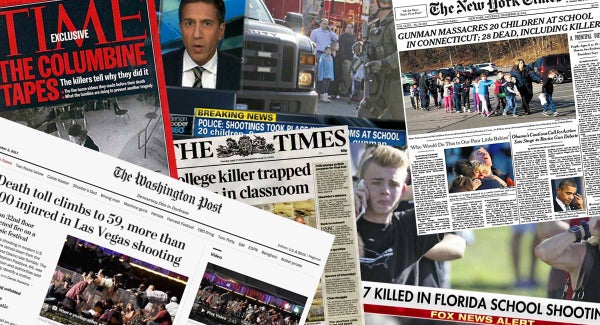Cruel Attention: How irresponsible media coverage fuels mass shootings

Photo Fatherly.com
It feels as if every day we are bombarded with news of another mass shooting. No one is safe; schools, universities, nightclubs, movie theaters, churches, synagogues, and any other institution you can name is subject to the risk of mass murder. This epidemic has permeated American culture, particularly American media, to the point where our nation has become numb to the constant stream of violent tragedies that infiltrates our magazines, TV screens, and news feeds.
In 2018, a would-be school shooter (who will not be named) had his plans thwarted when his grandmother turned him in after discovering a journal in which he wrote that he needs “to get the biggest fatality count I possibly can… I need to make this count.” His twisted dreams of notoriety are appalling, but not uncommon among mass murderers. These killers want recognition. Often before they carry out their acts of violence, they detail in their diaries and manifestos that they want to be known for their crimes. They want to generate a greater number of casualties than the last one to venture down the same path.
So when our mass media outlets plaster their yearbook pictures and excerpts from their childhood photo albums on magazine covers across the country, the press is playing right into the hands of the enemy. We need change, not biographies on the “sweet-boy-turned-killer” who just shot a dozen of his classmates. When you carry out an act of violence so horrific, your time with the boy scouts or the way you loved your mother become obsolete. You do not deserve to be recognized – and especially not romanticized – by the public. It is incredibly dangerous to give these individuals the exact kind of attention they want.
According to research cited by NPR, most mass shootings occur in clusters; it is statistically evident that these acts of violence spark a domino effect. The extensive, sensationalized manner in which the media covers these incidents only further encourages others to commit similar crimes. So why do we give a platform to these killers?
The only logical answer is money. People buy into these sensational headlines. As long as these stories sell, they will continue to populate the magazine shelves at the supermarket and will never cease to appear all over our news feeds. In the mass media circuit, greed consistently subjugates the best interest of the American people.
As a high school student, I am afraid. As an American, I am angry. As a human being, I know that this trend needs to change. Constant media circus surrounding mass murderers only fuels their successors.
The American mass shooting epidemic is a complex issue fueled by many factors, but there are steps we can take to reduce the risk even before legislation comes into play. Each time a killer is profiled in the tabloids as an altruistic or regular citizen turned deadly, the next one finds inspiration, and our lives are further put at stake.
